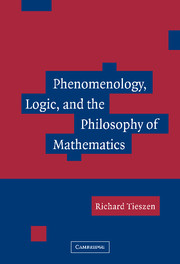Book contents
- Frontmatter
- Contents
- Acknowledgments
- Introduction: Themes and Issues
- PART I REASON, SCIENCE, AND MATHEMATICS
- PART II KURT GÖDEL, PHENOMENOLOGY, AND THE PHILOSOPHY OF MATHEMATICS
- PART III CONSTRUCTIVISM, FULFILLABLE INTENTIONS, AND ORIGINS
- 11 Intuitionism, Meaning Theory, and Cognition
- 12 The Philosophical Background of Weyl's Mathematical Constructivism
- 13 Proofs and Fulfillable Mathematical Intentions
- 14 Logicism, Impredicativity, Formalism: Some Remarks on Poincaré and Husserl
- 15 The Philosophy of Arithmetic: Frege and Husserl
- Bibliography
- Index
15 - The Philosophy of Arithmetic: Frege and Husserl
Published online by Cambridge University Press: 14 July 2009
- Frontmatter
- Contents
- Acknowledgments
- Introduction: Themes and Issues
- PART I REASON, SCIENCE, AND MATHEMATICS
- PART II KURT GÖDEL, PHENOMENOLOGY, AND THE PHILOSOPHY OF MATHEMATICS
- PART III CONSTRUCTIVISM, FULFILLABLE INTENTIONS, AND ORIGINS
- 11 Intuitionism, Meaning Theory, and Cognition
- 12 The Philosophical Background of Weyl's Mathematical Constructivism
- 13 Proofs and Fulfillable Mathematical Intentions
- 14 Logicism, Impredicativity, Formalism: Some Remarks on Poincaré and Husserl
- 15 The Philosophy of Arithmetic: Frege and Husserl
- Bibliography
- Index
Summary
The work of Frege and Husserl on logic and mathematics might, from a modern perspective, be compared under three main headings: mathematical logic, philosophical logic, and the foundations of mathematics. Under the first heading there is little room for comparison. Frege surpassed nearly everyone in the history of logic in his technical achievements and discoveries. Husserl contributed virtually no technical work to the development of mathematical logic. Under the second heading, however, there is a great deal of room for comparison. Many of the issues raised by Frege and Husserl involving language, meaning, reference, judgment, platonism about logic, and other matters are still actively debated in research in philosophical logic.
Although there is some overlap among the three areas, the grounds for comparison are different again in the foundations of mathematics. Frege had a technical program for the foundations of mathematics in his logicism and, as we know from the Grundlagen der Arithmetik, it was a program shaped by certain philosophical ideas. The program was formulated so precisely in the Grundgesetze der Arithmetik that it could be seen to fail. That is, it was possible to derive a contradiction from the basic laws of arithmetic as these had been formulated by Frege, and subsequent attempts to repair the damage led to developments that were further and further removed from Frege's effort to derive the principles of number from logic clearly and decisively.
- Type
- Chapter
- Information
- Phenomenology, Logic, and the Philosophy of Mathematics , pp. 314 - 336Publisher: Cambridge University PressPrint publication year: 2005
- 1
- Cited by



